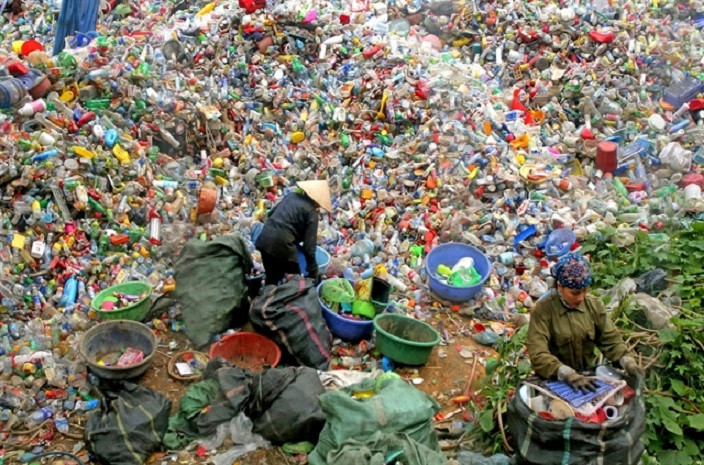Plastic pollution is a global crisis. Vietnam is taking bold steps to promote a green lifestyle, foster a circular economy, and work toward a sustainable future.

Speaking at the rally marking World Environment Day and the Month of Environmental Action 2025, held in Ha Long City, Quang Ninh, Deputy Minister of Agriculture and Environment Le Cong Thanh cited United Nations Environment Programme data showing that the world produces around 430 million tons of plastic annually. Over two-thirds are single-use products that quickly become waste.
In Vietnam alone, an estimated 1.8 million tons of plastic waste is generated each year, yet only about 27% is recycled. The majority is either buried or incinerated - wasting resources and posing serious risks to the environment, ecosystems, and public health.
“No nation can stand outside the fight against plastic waste,” affirmed Deputy Minister Le Cong Thanh. Vietnam has taken an active role in proposing global and regional cooperation mechanisms to combat plastic pollution at key international forums, such as the G7 Summit, World Economic Forum on ASEAN, and Davos.
Vietnam is among the first three nations to establish and operationalize a National Plastic Action Partnership (NPAP) task force and has shown strong commitment by participating in negotiations for a global agreement to end plastic pollution - paving the way for a green, circular, and sustainable economy.
Domestically, Vietnam has enacted the 2020 Environmental Protection Law and related regulations, alongside a series of initiatives such as the National Action Plan on Ocean Plastic Waste. This plan targets a 75% reduction in marine plastic waste by 2030, complete retrieval of lost or discarded fishing gear, and a ban on single-use plastics and non-biodegradable bags in all coastal tourism sites and marine conservation zones.
Other policies include a national proposal to enhance plastic waste management, incentives for businesses producing alternatives to plastic, and programs for waste sorting, collection, and treatment, including recycling and circular economy models. Campaigns like “Say No to Plastic Waste” have also gained traction.
Spreading green living
Deputy Minister Thanh acknowledged that despite progress, many challenges remain in managing and reducing plastic waste in Vietnam. Although legal frameworks and strategies are in place, enforcement is inconsistent. Circular economy policies and extended producer responsibility (EPR) remain new. Waste separation infrastructure is incomplete. Single-use plastic habits persist, and businesses are slow to adopt new technologies due to high costs. Waste collection and recycling efficiency is still lacking.
The Deputy Minister expressed hope that the Month of Environmental Action would continue to spread knowledge and successful models in plastic waste management and recycling - transforming challenges into opportunities for Vietnam to advance a high-tech, low-emissions circular and knowledge-based economy.
More than 1,000 delegates from central and local governments participated in the event, including representatives from the Ministry of Agriculture and Environment, the National Assembly, ministries, and international organizations such as the United Nations. Civil society groups, businesses, the armed forces, students, and local residents also joined, underscoring the nation’s growing awareness and sense of responsibility regarding environmental protection - especially amid the rising threat of plastic pollution.
The broad participation not only emphasized the importance of World Environment Day but also showcased national unity in pursuing sustainability, safeguarding ecosystems, and building a greener, cleaner future for generations to come. It also highlighted the success of outreach and the development of eco-conscious communities.
Notably, the event was supported by businesses across various sectors. These businesses demonstrated their commitment not only through financial contributions but also by taking meaningful, long-term actions to promote sustainable development, environmental protection, and corporate social responsibility.
Fighting plastic pollution is not just the government’s duty or the task of international organizations - it is a collective effort involving individuals, communities, and businesses. Together, we can create a plastic-free planet and a sustainably developing Vietnam in this green era.
nongnghiepmoitruong.vn